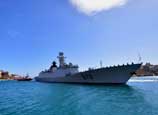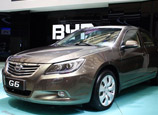
Related Reading
·Chinese president participates in BRICS Leaders-Africa Dialogue Forum
·Full text of the Fifth BRICS Summit Declaration and action plan
·BRICS 'set to be global force'
·BRICS summit delivers tangible results
·BRICS nations says significant risks remain for global economy
·BRICS summit ends as leaders agree to establish development bank
DURBAN, South Africa, March 27 (Xinhua) -- BRICS countries have agreed on a set of common institutions that will eventually see them depending less on the western controlled financial systems and information technology infrastructure.
The leaders of the five countries said the new institutions they have agreed to start will also benefit the larger community of the developing countries as part of making BRICS a globally influential body in the governance of the world's political, financial and economic systems.
Russia President Vladimir Putin said BRICS should become "key in future global governance." He promised that Russia will work towards ensuring that this objective is achieved.
Key among the new initiatives is the BRICS Development Bank that will be principally responsible for financing infrastructure projects in the five BRICS countries of South Africa, China, Brazil, Russia and China.
"We are satisfied that the establishment of the bank is feasible," said South Africa President Jacob Zuma. BRICS countries require U.S. 4.5 trillion dollars in the next five years to finance infrastructure projects, he said.
Another initiative is the formation of BRICS Trade and Development Risk Pool that will establish a sustainable and alternative insurance and reinsurance network for the BRICS countries.
The BRICS also agreed to form a Contingency Reserve Arrangement, a 100 billion dollars fund to be managed by the central banks of the member countries. The facility will provide precautionary effect to forestall short term liquidity pressures and strengthen global financial stability.
Each country's central bank is supposed to keep the fund's reserves as part of its own reserves.
The BRICS Cable is another project also approved by the leaders to focus on a new high capacity of 28,400 kilometre linking the BRICS countries. It will remove the dependency on developed countries as interconnection points by providing a direct route amongst the BRICS countries.
BRICS also set up a Think Tanks Council that will be responsible for coming up with innovative ideas to drive the multilateral body.
BRICS leaders said they will work with other developing countries to push for reforms in the global political and financial governance system.
"We urgently need reforms at the United Nations Security Council and the International Monetary Fund for the benefit of global development. These reforms will particularly be important for Africa," said India President Manmohan Singh.
"We are doing this for the good of the world, to make the global economy more resilient and more equitable," he said.
President Dilma Rousseff of Brazil said BRICS offers an opportunity for developing countries to define their growth and play a bigger role in the global political and financial governance. She said existing global financial institutions have been used as political tools especially on countries requiring aid, a reality that BRICS seeks to end.
Together the BRICS account for 25 percent of global gross domestic product (GDP) and 40 percent of the world's population, according to the IMF.
But the leaders said investments will be key to ensuring the sustainability of the BRICS and growth of its influence in the world. The private sector is expected to spearhead development projects among the member countries and Africa following the launch on Wednesday of the BRICS Business Council.
The countries plan to use trade to improve the living standards of their citizens and those of Africa, and create a larger pool of middle class population that will drive demand locally, ensuring that economic growth is sustainable.
















 6.5-magnitude quake hits Taiwan
6.5-magnitude quake hits Taiwan
kills one, injures 19


![]()
